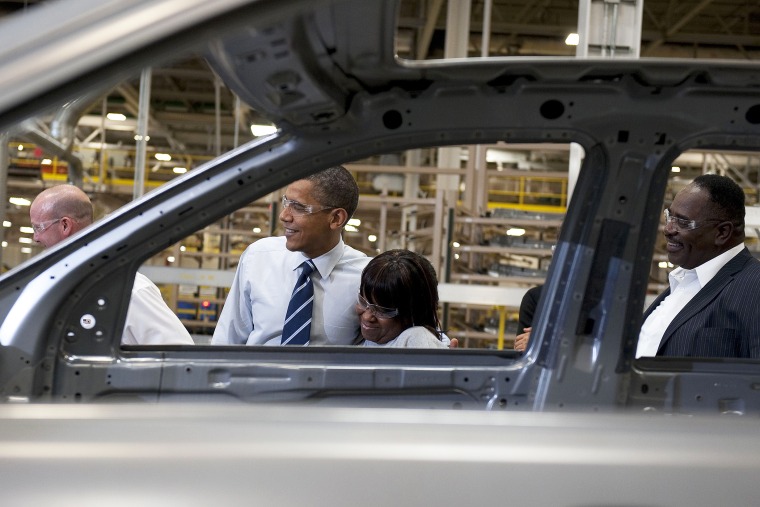If you want to understand the temperaments and governing philosophies of the Republican presidential candidates, pay close attention to the way they talk about an iconic moment of President Barack Obama's tenure: His decision, in the spring of 2009, to rescue Chrysler and General Motors. Most of the top GOP contenders have said the decision was a mistake. The latest to do so was Rick Perry, the former governor of Texas, who boasted Friday during MSNBC's "Morning Joe" that he was against all bailouts -- including the one for General Motors. "When corporate leaders make bad mistakes, they need to be held accountable, whether they are on Wall Street or on Main Street," Perry said.
GOP still balks at Obama's successful auto-industry rescue
Obama's rescue of the auto industry was a striking success. Do Rick Perry, Marco Rubio, and Jeb Bush know that? Or do they not care about the policy working?

The success of President Obama's auto-industry rescue was a pretty important issue in the 2012 campaign. It was effectively encoded into the Obama campaign's DNA -- "Osama bin Laden is dead and General Motors is alive" -- and the issue became a cudgel with which to beat Mitt Romney throughout the Midwest.
In light of the president's retirement, it seems unlikely the policy will as important in 2016, but as the Huffington Post's Jonathan Cohn explained over the weekend, the relevance of the industry rescue clearly hasn't faded entirely.
You can watch the full Perry interview here. Note, the former governor notes in his comments that Texas is home to an important GM manufacturing facility, though that apparently didn't affect his opposition to the White House policy.
If Perry's posture seems familiar, there's a good reason: plenty of Republican presidential hopefuls have expressed their skepticism, if not their unreserved opposition, to the policy that restored and strengthened the American automotive industry. Sen. Marco Rubio (R-Fla.) has voiced his opposition to the administration's policy, as have former Gov. Jeb Bush (R) and Sen. Ted Cruz (R-Texas). Wisconsin Gov. Scott Walker (R) has generally refused to talk about the issue at all.
They do realize Obama's policy worked, don't they?
As we discussed in April, by every metric, Obama’s policy worked. The industry -- the backbone of American manufacturing -- was on the verge of collapse. Without effective action, at the height of the economic crisis, hundreds of thousands of U.S. workers were poised to lose their jobs as the doors closed permanently on storied American companies.
Fortunately, Obama’s plan worked and the U.S. auto industry bounced back in an extraordinary way. Literally every Republican prediction of failure turned out to be wrong.
And yet, the 2016 field of GOP candidates remains wholly unimpressed. Sure, Obama rescued the industry. And sure, he saved the hundreds of thousands of jobs. And sure, the entire White House policy demonstrates the importance of competent big government working to save a struggling private sector from collapse.
But an old joke from academia comes to mind: the policy works in practice, but does it work in theory?